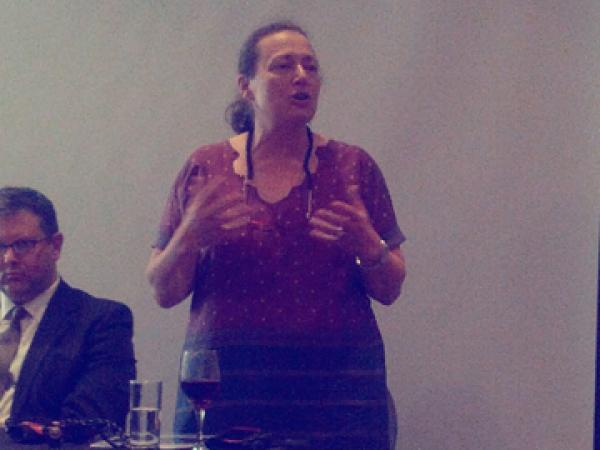

Janet Love, Director of the LRC. Photo by Sibusiso Tshabalala.
6 February 2014
The Legal Resources Centre (LRC) hosted a special event on 5 February 2014 to highlight its landmark silicosis case and the implications for future legislative and policy reform in South Africa.
The meeting took place as part of the 5th Alternative Mining Indaba.
For ten years, the Legal Resources Centre has represented 24 former miners who worked for Anglo American Mines. The miners, who come from some of Southern Africa’s most rural areas, had worked in Anglo American mines between 1970 and 2000 and had contracted silicosis.
Silicosis is an incurable but preventable lung disease. It is caused by prolonged and severe inhalation of silica dust particles. The prevalence of silicosis in South African mines can be traced back as early as 1903 to the Miners’ Phthisis Commission (Milner’s Commission) which deplored the unsanitary underground conditions in the mines as being “conducive to contracting infectious diseases”.
The Legal Resources Centre has worked in partnership with human rights interest firm Richard Spoor Inc., Abraham Kiewietz Attorneys, and a London based specialist law firm, Leigh Day.
National Director of the Legal Resources Centre Janet Love said that it was clear that South African [gold] mining operations were on the path of shrinkage, and that occupational diseases were often neglected by the mining companies.
“While we gather here at the Alternative Mining Indaba, we know that many South African mining companies are now moving to other regions like Latin America. We want to make it known that this cannot be our future. Companies mining in and out of this country should be held accountable for their liability,” said Love.
During the litigation process, the LRC proved that the dust levels in most Anglo American South mines exceeded internationally accepted standards.
Advocate Richard Moultrie, in-house counsel for the Constitutional Litigation Unit of the Legal Resources Centre, has worked on the case since 2005.The silicosis case had many factual complexities.
“This was not a straightforward legal matter. We had to work closely with experts to prove that Anglo American had been negligent in the way they had measured and attempted to keep dust levels at a minimum,” he said.
During the case, it emerged that Anglo American had relied on old-fashioned dust sampling methods. Anglo American had installed a gravimetric dust measuring system in the 1990s; 20 years after most countries had changed their dust-sampling methods.
Over the 10-year litigation period, Anglo American instituted two interlocutory applications. In 2005, Anglo claimed that the case presented by the LRC and its affiliates was ‘vague and not clear enough’. In 2007, Anglo American again claimed that it needed ‘further particulars of the miners and their health condition’.
By September 2012, six of the former miners had died. Their children and spouses who survive hail from Lesotho, Swaziland, the Eastern Cape and the Free State.
In September 2013, Anglo American requested that the case be settled out of court with the former miners and a settlement was reached.
“We advised the former miners to take the offer. After a long drawn out court case, it became strenuous on the miners and their families … some of them had died,” said Moultrie.
Although a civil claim is the best remedy for damages in South African law, it is often inadequate.
Richard Spoor Inc. has launched a class action involving 32 mining companies with operations in South Africa. Class action allows a large number of people with a common interest in a matter to sue or be sued as a group. Class action will improve access to justice for the former mineworkers as many individual cases would clog up the court roll. Spoor Inc. applied for class certification in 2012 and the 32 mining companies are set to release an answering affidavit to the court by the end of May 2014.
“We offered our manual labour in exchange for a pittance. Now, most of us are sick, and we have become a burden to our families”
Speaking on behalf of Richard Spoor Inc., Georgina Jephson said that the class action would fall into the Southern African region, where most mining companies have historically recruited their workers.
“Mining companies have recruited extensively in Southern Africa. Part of the class action lawsuit is to ensure all potential claimants in this case are represented,” Jephson said.
Dlavela Dlamini, a former mineworker from Swaziland, thanked the Legal Resources Centre and it’s partners for taking up the case.
“It pains me to speak here. We offered our manual labour in exchange for a pittance. Now, most of us are sick, and we have become a burden to our families,” said Dlamini.
Fatima Hassan, Executive Director of the Open Society Foundation (SA), commented that while the LRC’s 10-year litigation efforts deserve commendation, more work needed to be done for legislative and policy reform.
“The legislative framework for mining in South Africa is not as rigorous as it ought to be. The key lessons from this case pave a way forward for a legislative and policy reform agenda in the mining industry,” said Hassan.